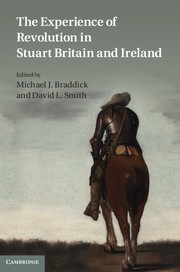Book contents
- Frontmatter
- Contents
- Notes on contributors
- Preface
- List of abbreviations
- JSM
- Introduction: John Morrill and the experience of revolution
- 1 The Scottish–English–Romish Book: the character of the Scottish Prayer Book of 1637
- 2 Popery in perfection? The experience of Catholicism: Henrietta Maria between private practice and public discourse
- 3 Sir Benjamin Rudyerd and England's ‘wars of religion’
- 4 Rhetoric and reality: images of Parliament as Great Council
- 5 Cathedrals and the British Revolution
- 6 History, liberty, reformation and the cause: Parliamentarian military and ideological escalation in 1643
- 7 Sacrilege and compromise: court divines and the king's conscience, 1642–1649
- 8 Law, liberty, and the English Civil War: John Lilburne's prison experience, the Levellers and freedom
- 9 On shaky ground: Quakers, Puritans, possession and high spirits
- 10 James Harrington's prescription for healing and settling
- 11 ‘The Great Trappaner of England’: Thomas Violet, Jews and crypto-Jews during the English Revolution and at the Restoration
- 12 The Cromwellian legacy of William Penn
- 13 Irish bishops, their biographers and the experience of revolution, 1656–1686
- 14 Religion and civil society: the place of the English Revolution in the development of political thought
- Bibliography of the major writings of John Morrill, 1967–2009
- Index
13 - Irish bishops, their biographers and the experience of revolution, 1656–1686
Published online by Cambridge University Press: 05 August 2011
- Frontmatter
- Contents
- Notes on contributors
- Preface
- List of abbreviations
- JSM
- Introduction: John Morrill and the experience of revolution
- 1 The Scottish–English–Romish Book: the character of the Scottish Prayer Book of 1637
- 2 Popery in perfection? The experience of Catholicism: Henrietta Maria between private practice and public discourse
- 3 Sir Benjamin Rudyerd and England's ‘wars of religion’
- 4 Rhetoric and reality: images of Parliament as Great Council
- 5 Cathedrals and the British Revolution
- 6 History, liberty, reformation and the cause: Parliamentarian military and ideological escalation in 1643
- 7 Sacrilege and compromise: court divines and the king's conscience, 1642–1649
- 8 Law, liberty, and the English Civil War: John Lilburne's prison experience, the Levellers and freedom
- 9 On shaky ground: Quakers, Puritans, possession and high spirits
- 10 James Harrington's prescription for healing and settling
- 11 ‘The Great Trappaner of England’: Thomas Violet, Jews and crypto-Jews during the English Revolution and at the Restoration
- 12 The Cromwellian legacy of William Penn
- 13 Irish bishops, their biographers and the experience of revolution, 1656–1686
- 14 Religion and civil society: the place of the English Revolution in the development of political thought
- Bibliography of the major writings of John Morrill, 1967–2009
- Index
Summary
God testifying of his gifts: and by it he being dead yet speaketh.
Hebrews 11:4.This verse from St Paul's letter to the Hebrews was only one of several scriptural texts that sustained the composition and publication of a growing number of funeral sermons and episcopal biographies in Stuart Britain and Ireland. The events of the 1640s and 1650s and the Restoration fused a long-standing tradition of writing about the English Reformation and its consequences with a debate about the legacies of the Civil Wars. During these decades the kingdom of Ireland experienced acute violence and vast transfers in landholding along ethnic and confessional lines. Its church as by law established endured attack and proscription, and then emerged as the defensive cornerstone of a hoped-for Protestant ascendancy.
Between 1656 and 1686 six printed and manuscript works commemorated the lives, deaths and publications of three Irish bishops, William Bedell, John Bramhall and James Ussher. Taken as a group they represent an evolving set of responses to tumultuous events worked out in the lives of individual church leaders. The series began with Nicholas Bernard's 1656 The life and death of the most reverend and learned father of our church, Dr James Ussher. This was a hugely extended version of a funeral sermon preached by Bernard at Westminster Abbey on 17 April 1656. William Bedell had died in early 1642, but his son and namesake's memoir, ‘Life and death of William Bedell’, was not composed until at least 1659.
- Type
- Chapter
- Information
- The Experience of Revolution in Stuart Britain and Ireland , pp. 253 - 269Publisher: Cambridge University PressPrint publication year: 2011



